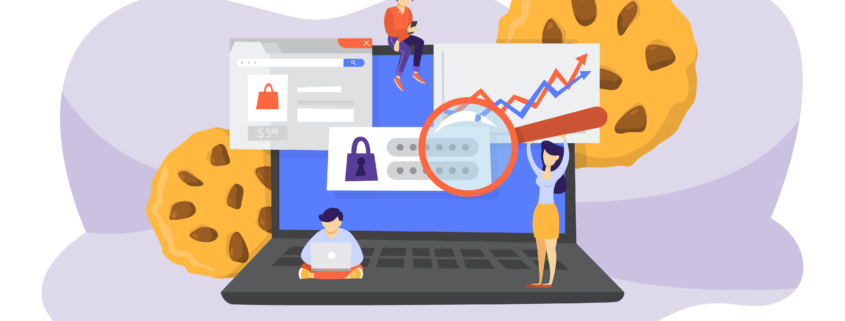What Are Cookies? The Good & Bad About Internet Cookies
In March 2018, the General Data Protection Regulation was enacted, forever changing how websites interacted and tracked a visitor’s data through a cookie. These digital cookies had always made it possible for any website to collect information about its visitors and use that information to create more marketing opportunities.
However, you can’t visit a website today without being warned that a website is collecting information and asking visitors, “Accept cookies?” This crucial step made it easier for internet uses to protect their online privacy and avoid websites that would track them via cookies.
If you want to learn how tracking cookies work and whether to incorporate them into your website strategy, read on about the cookie law and tips on how to use browser cookies.
What Are Internet Cookies?
Internet cookies are oftentimes called by several names: HTTP cookies, web cookies, browser cookies, tracking cookies, and so forth. These cookies are like a beacon that saves itself to your web browser and collects information about your online activities, communicating that information back to the cookie owner.
These digital cookies are tiny bits of data stored as a text file. They were invented to improve data transfer for faster browsing, allowing you to instantly sign into websites you’ve visited before, but it also has the capability to track you across the web.
For example, Facebook uses cookies to track its users as they browse away from their social network, showing them what you like so that advertisers can send you campaigns for products they think you’ll like.
How Websites Use Your Cookies
The main purpose of a cookie is to track what you’re doing online, traditionally through the web browser. For the most part, these are used to aid a user on a website, whether that’s for convenience or for tailored messaging.
Once placed on your browser, a website may track your most recent visits to help you. A retail website may use cookies to save your shopping cart so you can go back later to finish online shopping. They may also use it for authentication and save your login information for their website.
Beyond convenience, cookies also track other activities as you browse the web. This can include what type of information you’re engaged with on a website, whether or not you’re completing the desired action that the website would like you to take, and so on.
There are also different types of cookies. Traditionally, session cookies are used just when you are actively navigating the same site. Once you leave that website, the cookie also leaves your browser.
Tracking cookies, however, are more complicated and are persistent cookies that maintain an anonymous user identifier for you even after you leave the website. This can happen on both desktop and mobile devices. This is why you’ll often see ads following you from one website to the next simply because you googled “hair shampoo” and checked out a product on a website.
Additionally, there are supercookies, which are generally used by ISPs (internet service providers). They function similar to normal tracking cookies, however, your only option to remove them is by your ISP letting you opt-out of them.
The Good Things About Digital Cookies
Internet cookies are pretty powerful as a convenient tool for people who want to move swiftly from one site to the next, as well as reengage with previous sites they’ve visited.
Here’s a list of things that cookies do that make it easier and faster to browse online:
-
- Saves your login information
- Remembers your shopping cart details
- Identifies your location so you see local results
- Stores your preferences so webpages load quickly
- Personalization options such as language and currency
- Suggests content based on “related searches” and browser history
Under the GDPR law, websites must treat cookies and other technical information as personal data, which means that sites must show you a pop-up indicating how your data will be used. Formerly, websites could get away with just posting a privacy policy at the bottom of their websites.
This is why you have to accept cookies in order to browse some websites, as they most likely can’t allow you to navigate their site without fully understanding what they’re tracking.
The Bad Things About Digital Cookies
There’s a reason why the GDPR became so strict on websites. If you wonder why you always see pop-ups that have you accept or deny cookies, you should understand why they became necessary.
There are two different types of cookies: first-party and third-party cookies. First-party cookies are created by the domain that the website visitor is on. For instance, if you’re on Amazon and you ask it to remember your password for next time, the website is going to place a first-party cookie on your browser so that the next time you go on Amazon you don’t have to sign in.
Third-party cookies, on the other hand, are created by someone outside of the host domain. If a website provides a third-party company, such as an advertising agency or software, access to their site they can do this. These cookies are used for a multitude of reasons, including adding features to the site (live chat service) or enabling advertising to website visitors.
For both first-party and third-party cookies, it’s important for people to always be aware of the type of data that is being collected on the sites they visit (and this should extend to any service you sign up with).
There will be nefarious sites that will have malware and malicious cookies placed on the site to gather information on you (which are typically blocked by most browsers such as Firefox, Chrome, Safari and Microsoft Edge). However, there are thousands of sites that rely on this data to provide better experiences for their users, such as shopping sites, social networks and forums and many others.
Should You Allow or Remove Cookies?
If a website is preventing you from seeing content because you must “accept cookies,” then it’s important to read the policy and see how they will be using your information.
You can also remove or block cookies under your browser settings, typically in the same section as your browsing history. However, you should be careful if you rely on any cookies to log you in automatically, as deleting all cookies could lead to a loss of preferences that make it easier to browse.
How Businesses Should Use Browser Cookies
The best way for a business to use cookies is by being fully transparent with visitors through their policies. Once a visitor accepts cookies, businesses need to be careful about how that information is used.
While it may seem innocent to collect all cookies, if businesses use that information to set up advertising lists or sell the data of their visitors, then they should communicate that within their policies.
The best way to use cookies is to just make things more convenient for your shoppers and members. For example, you can use cookies to automatically log in to your customers or save their preferences when shopping on your ecommerce site. You can also set up highly tailored ads that retarget to repeat customers/visitors who would be interested in coming back for the same or complementary product/service.
Additionally, companies must protect their users from having cookies stolen or accidentally allowing third-party cookies to be installed through unscrupulous ads. If a user is accessing your content, they don’t expect to also be signing up for spam and other third-party ads.
You may not even realize this is happening if you work with ad networks and affiliate marketing links. It’s important to check online whether your networks are sharing information via browser cookies and opening up your website for a data breach, like what happened with Yahoo.
Final Thoughts: Are Cookies Bad?
Everyone and everything moves so fast in our digital world. It’s all happening in real-time, especially when it’s online. Cookies make the internet run faster and more conveniently.
With that said, users and businesses need to be aware of what they agree to when they accept cookies on websites. It’s always best to manage your cookies and remove any that have expired or that you don’t recognize from your browser settings.
For businesses, it’s important that you’re providing a better online experience for your website visitors and not deterring them from engaging with your company. If you’re looking to improve your advertising efforts, but don’t know where to begin with internet cookies, work with our team.
We can help you provide the best online experience for your audience, and ensure that your following best practices when collecting unique information to better serve them. Connect with us today to get started.



